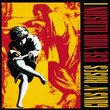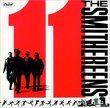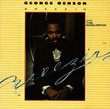| All Artists: Johannes Brahms, Bruno Walter, Columbia Symphony Orchestra Title: Brahms: Symphonies Nos. 2 & 3 Members Wishing: 0 Total Copies: 1 Label: Sony Release Date: 10/31/1995 Genre: Classical Styles: Historical Periods, Modern, 20th, & 21st Century, Symphonies Number of Discs: 1 SwapaCD Credits: 1 UPCs: 074646447123, 074646447123 |
Search - Johannes Brahms, Bruno Walter, Columbia Symphony Orchestra :: Brahms: Symphonies Nos. 2 & 3
 | Johannes Brahms, Bruno Walter, Columbia Symphony Orchestra Brahms: Symphonies Nos. 2 & 3 Genre: Classical The Columbia Symphony may not have been a first-class orchestra, but Bruno Walter trained them to do the right things, and they responded with first-class accounts of these symphonies. While there are instances of less tha... more » ![header=[] body=[This CD is available to be requested as disc only.]](/images/attributes/disc.png?v=15401716) ![header=[] body=[This CD is unavailable to be requested with the disc and back insert at this time.]](/images/attributes/greyed_disc_back.png?v=15401716) ![header=[] body=[This CD is available to be requested with the disc and front insert.]](/images/attributes/disc_front.png?v=15401716) ![header=[] body=[This CD is unavailable to be requested with the disc, front and back inserts at this time.]](/images/attributes/greyed_disc_front_back.png?v=15401716) |
Larger Image |
CD DetailsSynopsis
Amazon.com The Columbia Symphony may not have been a first-class orchestra, but Bruno Walter trained them to do the right things, and they responded with first-class accounts of these symphonies. While there are instances of less than crack ensemble, there is also some very fine first-desk playing, and the performances as a whole are marked by a natural feeling of movement, phrasing, and expression. Walter's approach to the music is kindly, caring, and wonderfully whole--sunny but not overly brilliant, warm but not overly heated, sincere but not overly impassioned. Anyone who thinks that means the conductor was slow, shapeless, or indulgent should give this disc a listen. There is thrust here, and plenty of momentum. The recordings are closely miked and somewhat bass-heavy, but in Sony's new 20-bit remastering the sound is wonderfully alive and direct. --Ted Libbey Similarly Requested CDs
|
CD ReviewsMasterful Insight to an Original Johannes Marlena | Los Angeles, CA | 10/06/2005 (5 out of 5 stars) "Symphony No. 3: "Original" is always a moniker used to described Brahms' Third, and it's surprising how the description still holds up today. Whereas most composers use the symphonic form to express highly epic themes (a la Beethoven, Mahler, Strauss, Tchaikovsky, Shostakovich et al.), the Hungarian composer among German and Slavic titans presents a surprisingly intimate and peaceful vision with his Third, surely one of the greatest of symphonies. Bruno Walter, after decades of working closely with Mahler's music, brings a level of concentration unmatched by any other conductor to bring together the disparate four movements of a work that threatens to become unglued at any moment's notice. Walter's vision is understated and unforced, and perhaps a little too detached to some ears (like mine), but its gentle power takes over the most casual listener. This is a piece that struggles throughout to resolve the turbulence and tension within to find that ultimate state of peace - Brahms, meanwhile, gives us plenty of gorgeous melody and orchestration along the way - and Walter succeeds masterfully to capture the drama. Furtwangler and The Berlin will always be my favorite for this, but all in all, a classic performance. ****1/2 Other References: Top Recommendation from Gramophone, Rough Guide, Jim Svejda's Classical Guide, Penguin Guide; High Recommendation from Classical Music: Third Ear Symphony No. 2: Brahms' Second is a great work in itself, though not as landmark as the Third, but many a connoisseur's favorite among Brahms' symphonies. Walter's work here may be even greater than on No. 3. Finely detailed, full of color and with perfect weight - it is a very mature interpretation. His understanding is deep and he is in complete control, seamless from one movement to the next. The Columbia Symphony, no great orchestra, responds with some of their best playing. Walter could even make you believe you're listening to The Vienna Phil - and that's saying a lot. Much is made of comparing this to Beethoven's Sixth, and if we're talking about richness in melody, genius in orchestration, having a rustic feel, surprising us with its occasional minuet-dance rhythms and finishing off with a grand final movement that thrills and leaves you breathless - sure, the comparisons ring true. But make no mistake, Brahms is a true original. ***** Other References: Top Recommendation from Gramophone, Rough Guide, Penguin Guide *In both accounts, Sony has done a superb job in the sound remastering to bring more body and clarity to the orchestra as compared to the original CBS releases.*" Bruno Walter was a great Brahms interpreter Alan Majeska | Bad Axe, MI, USA | 08/15/2005 (5 out of 5 stars) "I remember seeing Bruno Walter's Columbia Symphony recordings of Brahms Symphonies on LPs in the 1970s, and became more familiar with them when a college student, 1977-81. Walter was born in 1876, so was 21 in 1897 when Brahms died: their lives overlapped, and Walter, a product of the late Romantic age and student of Gustav Mahler(1860-1911), applies the needed affection and emotion to his interpretations of Brahms Symphonies.
There was a New York Philharmonic Brahms cycle conducted by Walter in the 1950s, and he conducted all 4 Brahms Symphonies with the Vienna Philharmonic and other orchestras in the earlier years of his career. Walter's name then, is authoritative in these works. I especially like his affectionate treatment of Symphony 2: every phrase is caressed with just the right amount of needed expression and affection, yet he never overdoes it. IV moves along, but not as quickly as some other conductors, such as Steinberg with the Pittsburgh Symphony (Command LPs or MCA CD, from about 1988). Symphony 3, while revealing a few slight flaws, is done "con amore" (with love) and IV really blazes in the development section: the trombone chords will lift you out of your chair. The sound in both symphonies is very good late 1950s stereo, with rich mid range, clear highs, and strong bass. I also like Walter's recordings of Brahms 1 and 4 (some feel 4 is over rated, but I find it charming). I believe these, along with Karl Bohm's 1975 Vienna Philharmonic cycle (Deutsche Grammophon 3 CD set), to be the best recordings of the Brahms Symphonies available in the US today." |










